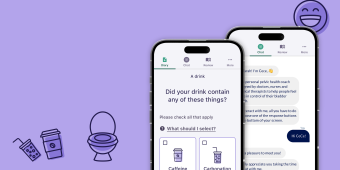Healthcare software developers must swap disruption for do no harm

At TXI, we work to learn everything we can about the businesses we work with. In healthcare, that means talking to industry leaders about how they approach technology and how consultants like us can work best with them. Dr. Elif Oker — senior healthcare executive, Blue Cross Blue Shield alum and founder of InSun Solutions, a healthcare and technology advisory focused on increasing the success rate of healthcare tech — walked us through her perspective on how healthcare and medical software development can come together.
It can be all too easy for developers in healthcare, especially at startups, to come at problems with unearned confidence. After all, here at TXI, we create technology solutions all day. Surely we can bring a little life to these seemingly musty systems, liberating healthcare providers from clunky electronic health records and wowing them with slick software products. If you do work in healthcare, you're probably already rolling your eyes. If you don't, know: It's not that simple.
How TXI approaches healthcare software and application development
Software developers and designers are used to operating in a world where "move fast and break things" is the driving motto. That is … not what you want to hear from your surgeon. In healthcare, the motto is "Do no harm" because it has to be. It's not that healthcare professionals are too slow to grasp brilliant ideas — they are highly educated, remember. They know how high the consequences can be for anything less than your best work.
Software developers and designers need to switch their line of thinking when developing for healthcare companies because the consequences of faulty software in the healthcare industry can be dire. Unlike app development for other industries, healthcare IT manages highly sensitive patient information, such as electronic medical records (EMR) and diagnostics data. The healthcare ecosystem demands more attention to detail and HIPAA-compliant data security. Patient portals and healthcare applications must be developed with a keen understanding of the consequences of any missteps, whether a security breach or a glitch in the system. Developers must adopt a new mentality when creating healthcare software solutions and prioritize patient safety and outcomes above all else.
Designers and developers in healthcare must respect and adapt
For the healthcare industry to feel comfortable with developers and designers, they must know they're dealing with people who understand the tremendous responsibility of looking after patients. Without that trust, doctors and medical professionals won't be inclined to work with them and certainly won't be inclined to learn from them.
Working in the healthcare space requires designers and developers to deeply respect the critical role that healthcare professionals play in people's lives. The healthcare industry demands a high level of trust, which can only be built when designers and developers understand the weight of their work. Designers and developers must realize that their work can directly impact patients' health and well-being, which should inform every decision they make. When healthcare professionals feel their concerns and priorities are respected, they will be more willing to collaborate with designers and developers to create innovative solutions to improve patient outcomes.
Adaptability is also a crucial trait for designers and developers working in healthcare. The healthcare industry is constantly evolving, and designers and developers must be able to adapt to these changes quickly. They need to stay up-to-date with the latest trends and developments in healthcare technology and the ever-changing regulations and standards that govern the industry. This requires a willingness to learn and a commitment to continuous improvement. By adapting to the needs of the healthcare industry, designers and developers can create solutions that meet the needs of patients and healthcare professionals today and potentially transform the industry in the future.
Choosing between healthcare software companies? Here are some questions you can ask them
Rapid iteration, minimum viable products, disruption — these things can be of great value. For healthcare developers to create workable solutions, they must understand the space. Yes, that includes the customer journey, but it also provides compliance, regulations, and the realities of patients' and caregivers' day-to-day lives and medical science. Instead of coming in hot with ideas, developers, and designers looking to play in healthcare should be prepared to admit what they don't know, ask questions, and hear the answers — even when they don't like them. This is the only way to start building a bridge between healthcare and tech - by proving that both sides hold the same values sacred and appreciate the consequences of getting it wrong.
What kind of experience does your company have in healthcare software development?
Asking the question, "What kind of experience does your company have in healthcare software development?" is essential in selecting a software development partner for your healthcare project. The healthcare industry is complex and highly regulated, and developing software requires specialized expertise and experience.
A company with a proven track record of success in healthcare software development can bring valuable insights, best practices, and domain knowledge to your project, which can help ensure its success. Moreover, an experienced healthcare software development company can help you navigate the regulatory landscape, ensure compliance with industry standards, and develop software that meets the unique needs of healthcare providers and patients. By asking this question, you can evaluate a potential software development partner's capabilities and determine if they are the right fit for your project.
Mobile app and software solutions play a crucial role in the healthcare industry, from custom healthcare software development services to mobile applications that streamline patient care workflows. With years of experience in healthcare software engineering, a top-notch development team can create cutting-edge solutions that meet the complex needs of healthcare organizations. Whether it's developing a healthcare app with interactive functionality or implementing automation and IoT to wearable medical devices, the possibilities for innovation are endless.
Do you have any certifications or compliance with regulatory standards such as HIPAA, GDPR, or FDA regulations?
When selecting a software development partner for your healthcare project, asking, "Do you have any certifications or compliance with regulatory standards such as HIPAA, GDPR, or FDA regulations?" is crucial. Compliance with regulatory standards is a critical aspect of healthcare software development, as it ensures the protection of patient data and adherence to industry-specific guidelines. A software development company certified or compliant with regulatory standards such as HIPAA, GDPR, or FDA regulations has demonstrated the knowledge, processes, and tools to ensure compliance and protect patient privacy.
By choosing a certified or compliant partner, you can rest assured that your project will meet all necessary regulatory requirements and be held to the highest data protection and privacy standards. Additionally, compliance with regulatory standards can help build trust with patients and healthcare providers, demonstrating a commitment to safety, security, and ethical practices. By asking this question, you can evaluate a potential software development partner's level of compliance and determine if they are the right fit for your healthcare project.
How do you ensure the privacy and security of patient data?
Privacy and security of patient data are critical aspects when it comes to healthcare apps. These apps collect and store sensitive medical information, which must be protected to maintain patient confidentiality and that unauthorized individuals do not misuse or access the information. The consequences of a data breach or patient data loss can be severe, including potential patient harm, damage to the healthcare provider's reputation, and legal and financial consequences.
Patients have a right to expect that their personal information is kept confidential and secure, and healthcare providers have a legal and ethical obligation to protect this information. Thus, healthcare apps must be designed with robust privacy and security measures, including encryption, access controls, and regular security audits. By ensuring the privacy and security of patient data, healthcare apps can help build trust with patients and healthcare providers, which can ultimately lead to better health outcomes and improved patient satisfaction.
What is your development process, and how do you involve stakeholders in decision-making?
Involving stakeholders in decision-making is crucial when it comes to healthcare apps. Healthcare apps are designed to help individuals manage their health and wellness. Thus, stakeholders such as healthcare providers, patients, and caregivers must be involved in decision-making to ensure that the app meets their needs and preferences. By involving stakeholders, the development team can gain valuable insights and feedback on the app's design, functionality, and features, which can help improve the app's overall effectiveness and user satisfaction. Additionally, involving stakeholders in decision-making can help build trust and foster collaboration between the development team and stakeholders, ultimately leading to a more prosperous and well-received app. Ultimately, involving stakeholders in decision-making can help ensure that healthcare apps are practical, user-friendly, and meet the needs of those using them.
Agile development frameworks and end-to-end testing are essential for ensuring that healthcare software solutions are of high quality and meet the needs of patients and healthcare professionals. API integration, artificial intelligence, and machine learning can also be leveraged to create advanced healthcare products that can transform the industry. Blockchain technology can provide additional security for patient data, while telemedicine and telehealth solutions can improve access to care.
Case studies and patient engagement are crucial for demonstrating the value of healthcare software solutions. By showcasing real-time data analytics and the impact of healthcare technology on patient health, designers and developers can build trust with healthcare professionals and patients alike. Custom solutions, including CRM and practice management software, can also improve the efficiency of healthcare organizations, freeing up time for patient care.
What is your approach to user experience and user interface design?
User interface and design are crucial elements when it comes to healthcare apps. Healthcare apps are used to manage and monitor essential health-related information and, thus, must be user-friendly, intuitive, and visually appealing. The design and interface of the app can impact the user's experience and engagement with the app. It can also affect the overall efficacy of the app in terms of helping users manage their health. A well-designed app that is easy to navigate and understand can help users stay motivated and engaged with their health goals.
On the other hand, a poorly designed app can lead to frustration, confusion, and, ultimately, disuse. User interface and design are critical in healthcare apps because they can impact patient outcomes. A user-friendly and intuitive app can help patients better manage their health and improve their overall well-being. Therefore, healthcare apps must be designed to the user's needs and preferences to ensure they are effective and well-received.
How do you ensure the usability and accessibility of your software?
Usability and accessibility are critical aspects when it comes to healthcare apps. These apps are designed to help individuals manage their health, which can be especially important for those with chronic conditions or disabilities. Thus, healthcare apps must be easy to use and accessible to all users. Usability ensures that the app is easy to navigate, understand, and use, which can help improve user engagement and satisfaction.
Accessibility, however, ensures that individuals with a wide range of abilities and disabilities can use the app. This includes considerations such as font size, color contrast, and alternative text for images, which can make a significant difference for users with visual impairments or other disabilities. When healthcare apps are usable and accessible, they can help individuals better manage their health, improve their quality of life, and achieve better health outcomes. Therefore, healthcare apps must be designed with usability and accessibility in mind to ensure they are practical and accessible to all users.
Learning from the mistakes of past medical programming
If people in healthcare have their guard up against technology, it's with good reason. Historically, new tools have yet to work out great for them. Too often, software in healthcare needs to be better designed, labor-intensive, and glitchy. For people coming off a 36-hour call or 18 hours in the OR, having to sit down at a computer and update a faulty system is a waste of hours that can be far better used in treating patients (or getting much-needed sleep).
See our tips on designing for healthcare by blending humanity with tech.
Perhaps the best and worst example of this is electronic health records. Despite the fact that many health systems and practices use some big-name EHRs, these systems are rarely interoperable and can't share information. Then there's the challenge of using it — multiple pages mean multiple clicks as a doctor focuses on data entry, not the patient in front of them. All these tedious little frustrations add up to an industry where 50 to 70 percent of physicians experience burnout due to the stress of maintaining electronic medical records.
Earning the trust needed to build great healthcare software
To set yourself apart from product companies that suck up resources and deliver little, you must prove to healthcare providers that you can enable their calling.
Be respectful of slow-moving systems - even if they frustrate you.
Developers creating custom healthcare software for hospitals and healthcare companies should respect slow-moving systems because the end goal of people's health is of utmost importance. Changes to systems that are slow to adopt new technologies can take time, particularly in the healthcare industry, where regulatory requirements and privacy concerns are a major consideration. Developers must be patient and work closely with healthcare organizations to understand their needs and ensure the software meets their unique requirements.
Moreover, they should be sensitive to the fact that even small changes can significantly impact the delivery of care, and they should work to minimize disruptions and ensure that the software integrates seamlessly with existing systems. Finally, they should be mindful of patient data security and privacy and ensure the software meets all regulatory requirements. By respecting slow-moving systems and working closely with healthcare organizations, developers can create custom healthcare software that is effective, efficient, and respectful of the needs of patients and healthcare providers.
Know what you know, and know what you don't know. Healthcare expertise cannot be Googled.
Developers creating custom healthcare software for hospitals and healthcare companies should acknowledge what information they know and what they don't because the end goal of people's health is so important. Healthcare knowledge can't be simply googled. Developers need to have a deep understanding of the healthcare industry and the complexities of patient care to create effective and relevant software. While developers may have extensive technical knowledge, they may not have the expertise to understand the nuances of healthcare workflows, regulatory requirements, or patient needs.
Therefore, they should work closely with healthcare providers and subject matter experts to identify the specific needs and conditions for the software. By collaborating with healthcare professionals, developers can create software that meets the needs of patients and healthcare providers while ensuring that it is secure, effective, and compliant with relevant regulations. Acknowledging what they know and don't know, and working closely with healthcare professionals, can help developers create software that delivers real value in the healthcare industry.
Be humble and do your homework. Don't assume that your personal experience with healthcare defines the problem you are trying to solve.
Software developers creating custom healthcare software for hospitals and healthcare companies should be humble and do their homework. It's essential to recognize that personal experience with healthcare may not necessarily define the problem they are trying to solve. Every healthcare organization has unique challenges and workflows that require custom software solutions. Developers need to understand the specific needs and requirements of the healthcare organization they are working with and should not assume that a one-size-fits-all approach will work. Developers should be open to feedback from healthcare professionals and patients to refine the software to better meet their needs.
Additionally, developers must do their homework and research healthcare regulations, security requirements, and best practices to ensure the software is compliant, secure, and effective. By being humble, listening to feedback, and doing their homework, developers can create effective, efficient software that meets the healthcare organization's unique needs.
Spend time with patients, providers, and administrators. You need all perspectives to learn how the system works.
Software developers creating custom healthcare software for hospitals and healthcare companies should spend time with patients, providers, and administrators. This is because they need all perspectives to learn how the system works. Each group has a unique view of the healthcare system and can provide valuable insights into the specific needs and requirements for the software. By spending time with patients, developers can better understand the challenges they face and how the software can be designed to improve their experience.
By spending time with providers, developers can learn about the complexities of delivering care and how the software can improve their workflows and help them provide better care to patients. By spending time with administrators, developers can understand the business challenges and regulatory requirements that impact the healthcare organization. With a deep understanding of the perspectives of patients, providers, and administrators, developers can create software that meets the healthcare organization's unique needs and delivers real value to patients and providers.
The consequences of bad software are high - the consequences of bad healthcare are higher.
In technology, people are used to high stakes — millions of dollars, critical transactions, and ever-changing security threats. In healthcare, that math reduces to something much more consequential: whether people live or die. No matter how much developers and designers grow to understand healthcare, they'll never have to look a frantic loved one in the eyes and say, "I'm sorry, we did everything we could." Understanding that — and humbly embracing the awesome responsibility that comes with it — is the first step to building healthcare software right.
FAQs
Why is healthcare software development so crucial?
Healthcare software development is crucial because it can potentially revolutionize the healthcare industry. With the integration of technology and healthcare, patients can receive more personalized and efficient care, while healthcare professionals can access real-time data to make more informed decisions. Healthcare software development has also led to innovative solutions to previously unsolvable problems. For example, telemedicine apps have enabled patients to access medical care remotely, while wearable devices can track patient health data around the clock. Overall, healthcare software development has the power to improve patient outcomes, reduce costs, and enhance the overall quality of care.
What are some of the most common challenges for healthcare software developers?
Healthcare software developers face several challenges that make their work unique compared to other types of software development. One of the most common challenges is complying with strict regulatory requirements, such as HIPAA regulations. Developers must ensure their software is secure and that patient data is protected. Additionally, healthcare constantly evolves, with new technology and processes always emerging. Developers must stay updated with the latest trends and innovations to ensure their software remains relevant and practical.
Another challenge is the need to work with complex data sets and integrate them with other healthcare systems, such as electronic health records (EHRs), which can require specialized knowledge and expertise. Finally, healthcare software developers need to understand the needs of their end-users, including healthcare providers, patients, and administrators, and design software that meets those needs while remaining easy to use and intuitive.
What are some of the best ways healthcare software developers can partner with healthcare professionals?
Healthcare software developers can partner with healthcare professionals in various ways to ensure that their products meet the needs of patients and providers. One effective way is to establish ongoing communication and collaboration between developers and healthcare professionals, such as physicians, nurses, and other clinicians. This can involve regular meetings, feedback sessions, and user testing to ensure that the software aligns with the workflows and needs of healthcare providers. Developers can also leverage the expertise of healthcare professionals to inform product design, user experience, and functionality. By working closely with healthcare professionals, developers can create products that are more effective, user-friendly, and, ultimately, have a greater impact on patient outcomes.
Published by TXI Healthcare in Digital Health

Let's shape your insights into experience-led data products together.


